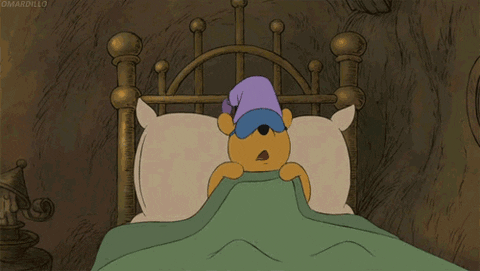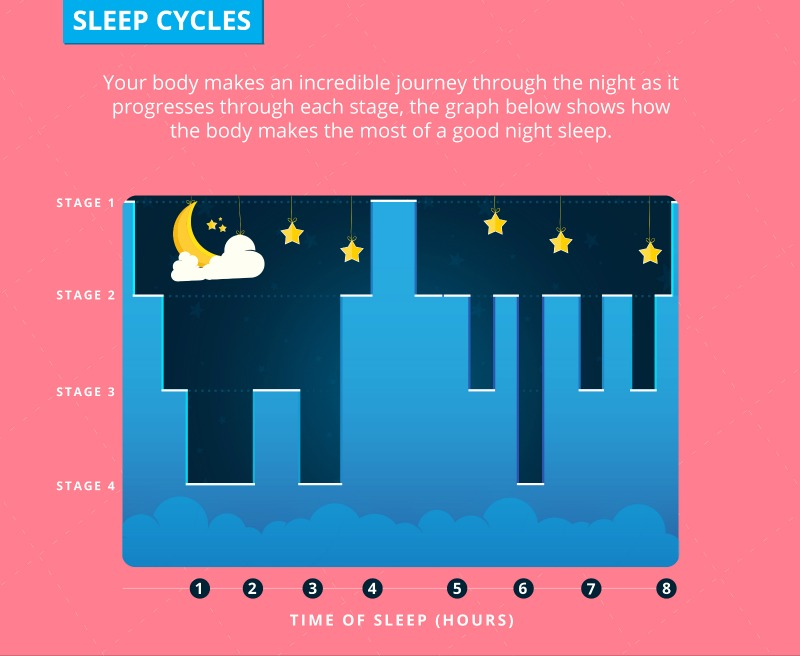As movement professionals we spend a large amount of time advocating for our clients to get up and move around throughout the day to prevent the ailments associated with a sedentary lifestyle. But just as important as what we do during the day, is what we do at night. SLEEP!

Sleep allows our body to recover from the day’s activities. We all know (and love) the feeling of falling into bed after a busy day running errands, doing yard work, or cheering on our kids at the ball park. But what is happening when we close our eyes and rest our head on the pillow? To understand the underlying mechanisms, we first have to appreciate the different segments that comprise our sleep cycle.
Sleep Cycles
The American Academy of Sleep Medicine (AASM) defines 4 stages of the sleep cycle. Before that, most specialists referred to five stages. For the purpose of this break down I’ll describe the four stages outlined by the AASM.
Stage one, is the initial drift off into slumber land. This stage is the shortest, lasting under five minutes and represents the beginning changes in brain activity. In stage 2 the body falls into a more relaxed state, brain activity continues to slow but there are short spurts of activity. The third stage, characterized by a pattern of delta waves, is marked with the physical changes of decreased muscle tone, decreased heart rate, and decreased respiratory rate. Stage four, commonly referred to as REM sleep is when brain activity increases. But wait?? Why is activity increasing when we are trying to rest? This increase in activity is linked to the detailed dreams that people often report during a restful night’s sleep. This increased brain activity is accompanied by a temporary paralysis of the major muscle groups of the body. This allows the muscles to relax and damage accumulated throughout the day to repair. With that basic appreciation for the different phases associated with the sleep cycle we turn our attention to the major question at hand, how does our body employ sleep to help heal itself?
Sleep and Recovery
While we sleep the body undergoes numerous physiologic changes that encourage healing and reduction of pain. During stages 3 and 4 of the sleep cycles the body sees its highest degree of growth hormone secretion. Growth hormone or more commonly known as human growth hormone, functions to stimulate cellular growth, reproduction and regeneration. Sleep impairments have demonstrated decreased secretion of this vital hormone and thus lead to decreased tissue healing capacity. Sleep also has a noted interaction with our body’s digestive system further impacting our body’s ability to utilize nutrients and utilize them as building blocks to recover. Sleep-deprived individuals have demonstrated impaired glucose metabolism, decreased testosterone, and increased cortisol levels in many studies. These physiologic changes all negatively impact our body’s ability to recover from either a rigorous therapy session or the stress placed on our body following surgery. So, what can we do to maximize our time in bed to ensure that our body gets back to tip top shape?
Action Steps!
Below are listed some Healthy Sleep Habits modified from the AASM
- Keep a consistent schedule. This means going to bed and waking up at around the same time of day regardless of week day or weekend.
- Set your bedroom up for success. Keep the room as dark as possible and the temperature at a cool, but comfortable level.
- Strive for 7-9 hours of sleep per night. This means going to bed early enough to achieve at a minimum 7 hours!
- Limit your exposure to electronics and bright lights within 1 hour of bed time. If you can’t, give blue light blocking glasses a try to help encourage melatonin secretion as you wind down.
- Avoid the afternoon caffeine vice, late night feast, or alcoholic beverage before bed. All of these negatively affect our body’s ability to achieve restorative sleep.
For questions or more information contact us online or give us a call at 866-588-0230.




